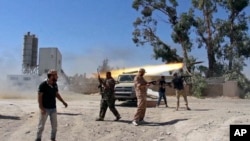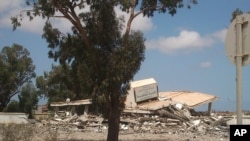Libyans had high hopes after their country’s liberation from dictatorship in 2011, but now face escalating violence and a growing humanitarian crisis.
Recent weeks of inter-militia fighting have left hundreds dead in Tripoli and Benghazi, while food, water and fuel supplies to civilians have been disrupted.
International concern
The power vacuum in Libya has resulted in the smuggling of weapons, drugs, and people across the Sahel region and provided resources, training, and recruitment opportunities for terrorists, analysts say.
And that is causing international concern.
U.S. Secretary of State John Kerry recently assured Libyan prime minister Abdullah al-Thinni of continued U.S. support.
“We intend to work very, very closely with our Libyan friends in an effort to try to help to build the capacity of the government to be able to restore stability,” Kerry said.
Thinni warned that Libya is at risk of being divided and has called for international intervention to stop the fighting or at least to protect key installations and civilian populations.
At risk
Karim Mezran, a senior fellow at Rafik Hariri Center for the Middle East, said the risk is real.
“The violence gripping Libya is due to a political struggle between groups that could broadly be characterized as Islamists and anti-Islamists,” he said. “As Libya urgently needs help from its allies, most countries, including the United States, are evacuating their embassies or drastically downsizing.”
Mezran said that Libya’s allies wish to mediate a solution to the conflict, they must maintain contact with Libya’s major political actors — the Muslim Brotherhood and the National Forces Alliance, and the leaders of the warring militias from Misrata and Zintan.
He said neither the “Islamist” nor the “anti-Islamist” forces seem capable of winning a quick or conclusive victory over the other.
“Only a mediation process, aligned with the new parliament and a new constitutional settlement, and backed by the international community, offers any prospect of breaking the cycle of fear and violence in Libya,” Mezran said.
Military intervention?
Mezran said the U.S. and the European Union should consider a threat of limited military intervention to force the warring sides to accept a ceasefire.
“The United States and its allies have strategic interests in ensuring that Libya does not collapse back into civil war or become a haven for al-Qaida or other terrorist groups within striking distance of Europe,” Mezran said.
Still, Mezran said there is not much interest in Western capitals for a military response.
Libyan foreign minister, Mohamed Abdulaziz, has asked for “trainers” to support the weak Libyan security forces.
The United States, United Kingdom, Italy, and Turkey have announced plans to train abroad 15,000 to 18,000 security personnel and former members of militias for a “General Purpose Force” whose members would join the Libyan military after an approximately six-month training cycle.
Ambassador David Mack, former Deputy Assistant Secretary of State for Near East Affairs, said the United States is honoring its agreement to provide such needed training.
“The U.S. is playing an active role in helping the Libyan government establishing security; training Libyan security personnel, and having discussions with Libyan officials on how to support institution building,” Mack said.
Political consensus
But Mack said that it is up to Libyans to reach a political consensus regarding what kind of future they want and said that there is a limit to what the U.S. can do in the Middle East and Africa post-Arab spring.
“The U.S. does not have a magic formula for democracy, it can provide a certain amount of assistance, but ultimately a lot of the hard political decisions have to be taken by the countries themselves,” Mack said.
Each Arab Spring country has its own circumstances, he said. While Libya is suffering from an absence of institutions after so many years of one-man rule, Mack said, institutions in Egypt were overwhelmed by one institution - the strong military.
But Mezran said that the U.S. and the international community must act in Libya because tensions may spiral quickly.
“Both the U.S. and the international community should have a contingency plan if the situation in Libya continues to deteriorate,” he said.





